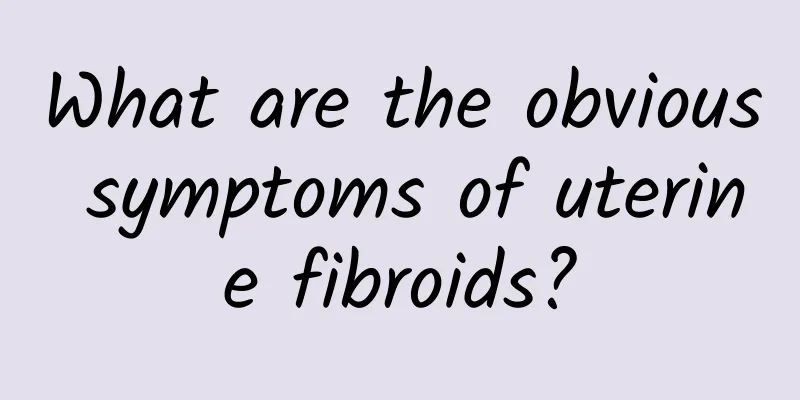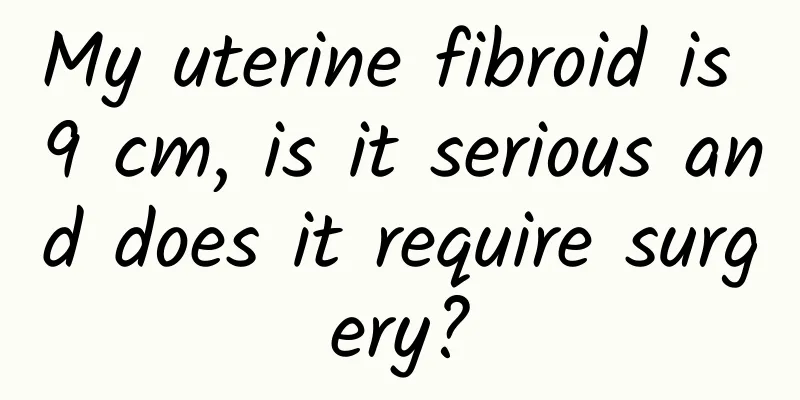What are the obvious symptoms of uterine fibroids?

|
Do you know about uterine fibroids? What symptoms do you know about uterine fibroids? Let's follow the experts to learn about the symptoms of uterine fibroids. Symptoms of uterine fibroids include: 1. Pain: Generally, uterine fibroids do not cause pain symptoms. If pain symptoms occur, it is mostly caused by pathological changes in the fibroids themselves or combined with other pelvic diseases. 2. Uterine bleeding: Uterine bleeding is the most common symptom of uterine fibroids. Clinically, it can be manifested as menorrhagia, cyclical bleeding, increased menstrual flow, and often accompanied by prolonged menstruation. This type of bleeding is the most common. 3. Anemia: The main symptom of uterine fibroids is uterine bleeding. Long-term excessive menstruation or irregular bleeding can lead to hemorrhagic anemia. Clinically, there are different degrees of anemia symptoms. 4. Hypoglycemia: Hypoglycemia associated with uterine fibroids is also rare. The main manifestations are low fasting blood sugar, loss of consciousness and even shock. The symptoms can completely disappear after glucose injection. The symptoms of hypoglycemia will completely disappear after tumor resection. 5. Abdominal mass: The uterus is located deep in the pelvic cavity, and no mass can be felt in the abdomen when the fibroids first occur. 6. Vaginal discharge: Uterine submucosal fibroids or cervical submucosal fibroids can cause increased leucorrhea. Once the tumor is infected, there may be a large amount of purulent leucorrhea. If there is ulceration, necrosis, and bleeding, there may be bloody or purulent vaginal discharge with a foul odor. 7. Compression symptoms: Uterine fibroids can cause compression symptoms of surrounding organs. Uterine anterior wall fibroids close to the bladder can cause bladder irritation symptoms, manifested as frequent urination and urgency; when cervical fibroids grow forward to a considerable size, they can also cause bladder compression and lead to upper pubic discomfort, frequent urination, urinary retention or overflow incontinence. 8. Infertility and miscarriage: Most patients with uterine fibroids can conceive and carry their pregnancy to term. However, some women of childbearing age are infertile and cannot find other reasons except fibroids. They become pregnant after myomectomy, which shows that infertility is related to fibroids. 9. Erythrocytosis: Uterine fibroids accompanied by erythrocytosis (erythrocytosis) are rare. The above are the symptoms of uterine fibroids. Through the above introduction, I believe you have a certain understanding of the symptoms of uterine fibroids. If you have any questions about the symptoms of uterine fibroids, please consult our online experts. Uterine fibroids http://www..com.cn/fuke/zgjl/ |
<<: Five symptoms to determine whether you have uterine fibroids
>>: What are the early symptoms of ectopic pregnancy?
Recommend
The golden period for weight loss after childbirth? Pregnancy is the key
When a baby is born into this world, the first th...
Can I eat peaches if I have pelvic inflammatory disease? There are great benefits
For some women with pelvic inflammatory disease, ...
Five things to note about cervicitis
What are the precautions for cervicitis? Experts ...
Will the IUD cause post-menstrual bleeding?
Will the IUD cause post-menstrual bleeding? The I...
Classification of causes of threatened abortion
In real life, some pregnant women have repeated t...
Introducing two causes of ovarian cysts
Do you want to know the causes of ovarian cysts? ...
How to diagnose adnexitis
How to diagnose adnexitis? Adnexitis is one of th...
There are many taboos during confinement. Mrs. Tang Zhizhong: secretly wash her hair and take a bath
In the past, there were many taboos for mothers d...
What will happen if you don't see a doctor if you have vaginitis?
Vaginitis is a common reproductive tract infectio...
What are the treatments for endometriosis?
For many women nowadays, they always suffer from ...
Why does vaginitis always recur?
What is the reason for the recurrence of vaginiti...
What are the consequences of an incomplete abortion?
Abortion can cause great harm to women, so they s...
The main harmful manifestation of painless abortion
There are many types of abortions, and painless a...
How to take care of your body after miscarriage? Pay attention to these 5 points
After a miscarriage, women must combine work and ...
Will ectopic pregnancy affect future pregnancy? See what the doctor says
Whether an ectopic pregnancy will affect later pr...









